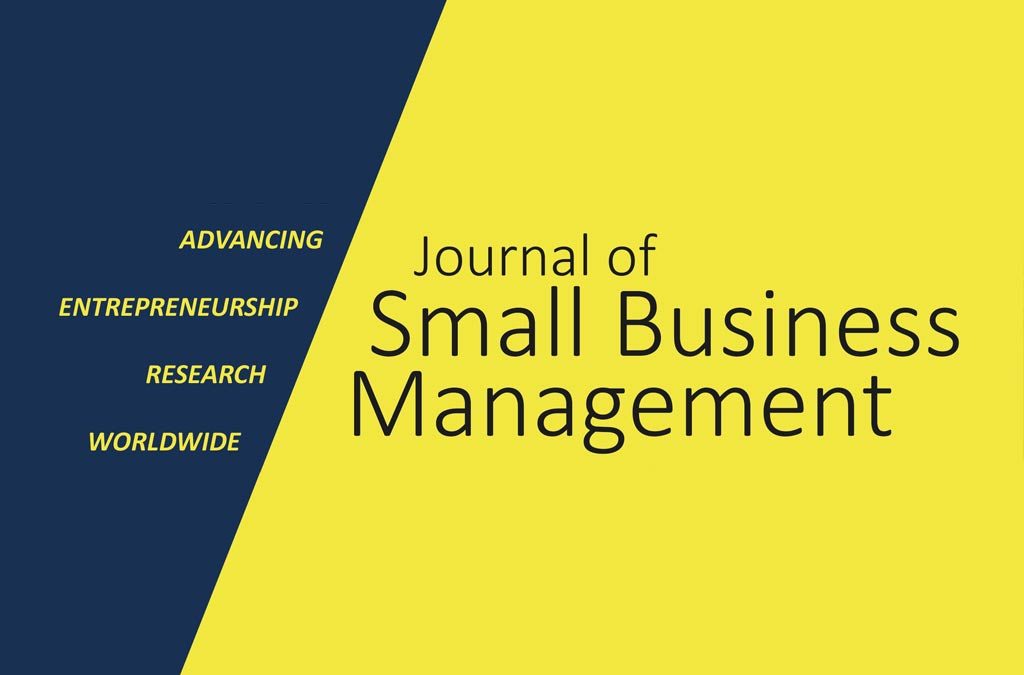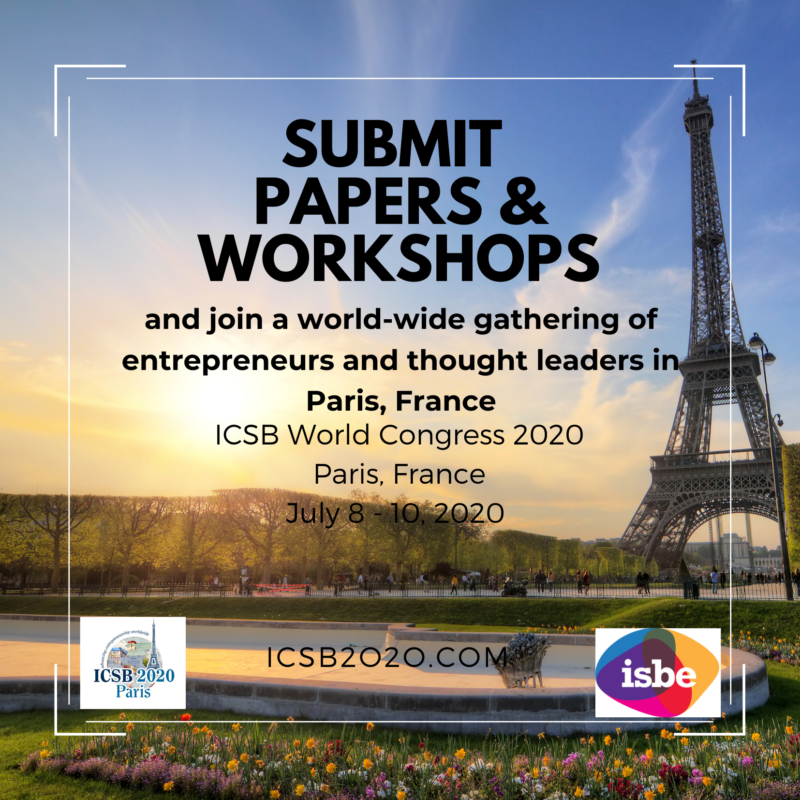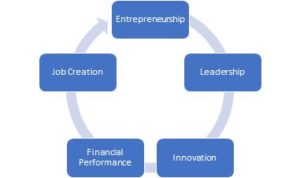
ICSB & ISBE Team-up for High Impact Research Papers and Workshops at ICSB World Congress 2020 in Paris!
ICSB & ISBE Team-up for High Impact Research Papers and Workshops at ICSB World Congress 2020 in Paris!
Tuesday, March, 3, 2020
ICSB & ISBE Team-up for High Impact Research Papers and Workshops at ICSB World Congress 2020 in Paris!
Tuesday, March, 3, 2020
About the Institute for Small Business and Entrepreneurship
|
|
|
|
ICSB invites everyone to the ICSB World Congress in Paris, France to showcase their creative ideas, inventions, inspirations, and achievements in Entrepreneurship and support to SMEs.
|

Pioneering Research on Job Creation and Destruction Awarded 100,000 Euros
Pioneering Research on Job Creation and Destruction Awarded 100,000 Euros
Monday, March, 2, 2020
Pioneering Research on Job Creation and Destruction Awarded 100,000 Euros
Monday, March, 2, 2020
The 2020 Global Award for Entrepreneurship Research goes to John Haltiwanger, Professor of Economics at University of Maryland, USA
Haltiwanger is awarded for his pioneering research advancing our understanding of job creation and destruction, productivity growth, and the role of small business and entrepreneurial firms in economic development. The Global Award is the foremost international award in entrepreneurship research with a prize sum of € 100,000.
Professor John Haltiwanger has made significant contributions to the field of entrepreneurship by improving our understanding of job creation and destruction, productivity growth, and the role of small and medium-sized firms (SMEs) in economic development. He has played a major role in the careful development of large, longitudinal firm-level datasets, and introduced a novel and widely adopted measure of firm growth that addresses previous statistical biases. His work has influenced public policy and national statistical offices around the world.
Professor Haltiwanger’s most important contributions include:
• To question the conventional wisdom of the job creation ability of small business. He provides evidence that large and mature firms account for most of the newly created manufacturing jobs, and that these jobs are of higher quality than those in SMEs in that they are more likely to persist in subsequent years.
• To show the importance of firm age as opposed to size: the job creation in small firms takes place in the first few years of their existence, as captured in the “up-or-out” dynamics.
• The decomposition of productivity growth into contributions from continuing, entering, and exiting firms. He shows that the largest component of growth can be attributed to continuing firms improving their productivity over time.
The Award ceremony will take place in Stockholm on May 11. For further information, please visit our website, www.e-award.org.
The Global Award for Entrepreneurship Research is the foremost global award for research on entrepreneurship. The Award honors significant contributions to theory-building on entrepreneurship and small business development. The Award consists of the statuette ”The Hand of God” by the Swedish sculptor Carl Milles and a prize amount of 100 000 Euros.
Founder of the Award: Swedish Entrepreneurship Forum. Co-founder: The Research Institute of Industrial Economics (IFN). Sponsor: Vinnova – Sweden´s Innovation Agency. Donor: Lars Backsell.

STI Forum 2020 5th annual Multi-stakeholder Forum on Science, Technology and Innovation for the Sustainable Development Goals 12 – 13 May 2020
STI Forum 2020 5th annual Multi-stakeholder Forum on Science, Technology and Innovation for the Sustainable Development Goals12 – 13 May 2020
Monday, March, 2, 2020
STI Forum 2020 5th annual Multi-stakeholder Forum on Science, Technology and Innovation for the Sustainable Development Goals12 – 13 May 2020
Monday, March, 2, 2020
Call for Innovations!
|
The United Nations Department of Economic and Social Affairs, in collaboration with the Global Innovation Exchange (GIE), has initiated its 2020 Call for Innovations to help implement the Sustainable Development Goals (SDGs). The call, which is open from now until 9 March, 2020, is open for innovators, scientists, entrepreneurs and sustainability change agents worldwide to submit their workable solutions for SDG implementation, particularly through one or more of the six “entry points” identified in the Global Sustainable Development Report:
The selected innovators will be invited to participate in the 2020 STI Forum at UN Headquarters in New York on May 12 and 13. At the Forum innovators will have the chance to present their innovation and connect with a valuable network – other innovators, those who can support or scale up your innovations, and those seeking to utilize such innovations. This year’s Call for Innovations is hosted on a GIE Custom site and will use GIE’s innovation profiles as applications for the contest. As part of this partnership, all innovators who respond to the Call will be automatically featured on Global Innovation Exchange (GIE) which brings many other benefits such as:
The purpose of this Call for Innovations is to support existing innovative solutions by creating networks and communities among people who are developing technological innovations, those who can support or scale up such innovations, and those who need such innovations in order to implement the SDGs. Innovations are sought from diverse backgrounds, including women, youth, Indigenous peoples, and open collaborative networks. Innovations can be submitted before 9 March 2020 via Global Innovation Exchange at https://stiforum4sdgs.globalinnovationexchange.org. |

The Butterfly Effect for MSMEs
The Butterfly Effect for MSMEs
Monday, March, 2, 2020
The Butterfly Effect for MSMEs
Monday, March, 2, 2020
Can Small Changes in Entrepreneurship Lead to New Global Outcomes?

The Other Half: State, Challenges, and Action Items for the Realization of Women Entrepreneurial Opportunities Worldwide
The Other Half: State, Challenges, and Action Items for the Realization of Women Entrepreneurial Opportunities Worldwide
Monday, February, 24, 2020
The Other Half: State, Challenges, and Action Items for the Realization of Women Entrepreneurial Opportunities Worldwide
Monday, February, 24, 2020
Is there Systemic Bias Towards Segregated Gender Roles in Society that is Constraining Women Potential in Entrepreneurship?
President James Madison once stated that “education is the foundation of civil liberties.” Therefore, this gender unbalanced state of affairs might also escalate to the structure of several other institutions, including public and private sector activities, and the distribution of entrepreneurial opportunities.In this brief report, we review selected gender indicators across countries, and then compare them with entrepreneurial indicators in an attempt to understand the distribution of business opportunities across economies. After reviewing the general numbers, we focus on key challenges and practical recommendations for action (Read more…).

Humane Entrepreneurship – Thinking Paper Series Issue 2
Humane Entrepreneurship – Thinking Paper Series Issue 2
Sunday, February, 23, 2020
Humane Entrepreneurship – Thinking Paper Series Issue 2
Sunday, February, 23, 2020
Humane Entrepreneurship is More than Just a Label
|
As humans, we tend to label everything; we love to define things to help things make sense or to grasp at understanding. But a label is so short, and people are expected to make a judgment, decision, or grasp an idea based on just a couple of words. But there might be so much more to something than just it’s label. There might be an entire concept wrapped up neatly within the packaging of those 2 or 3 words. Words like Humane Entrepreneurship. What comes to mind when you read those two words—Humane Entrepreneurship? Some might just dismiss it as yet another business model in a world full of ever-changing and competitive business ideas. Some may associate it with a good cause or general humanitarian efforts. Yet Humane Entrepreneurship is more than just a label. It’s a concept that encompasses a whole idea. What is the concept of Humane Entrepreneurship? Humane Entrepreneurship as a concept promotes the ideas of human and corporate growth played out simultaneously, as well as protection of and the responsible use of natural resources. When the concept of Humane Entrepreneurship becomes a culture in a company, it influences the innovation performance through, not only attitudes, values, beliefs, and behavior, but also company-wide management practices, processes, and protocols. Decision-making within the company would be based on what is good for its employees, its business, and the environment all at the same time. When companies adopt the concept of Humane Entrepreneurship, they are starting a positive cycle (also known as a virtuous cycle) within, a cycle that keeps itself going to the benefit of the company and its employees. It begins with entrepreneurship and well-managed leadership which establishes a company culture or environment. This positive environment encourages, enthusiastically looks for, and nurtures innovation from its employees. That innovation leads to an increased financial performance by the company, which in turn encourages new job creation, which then leads back to entrepreneurship, beginning the cycle once again. Similar to a sustained natural cycle like the water cycle (rain fill bodies of water, sun evaporates the water, water vapor condenses into clouds, clouds produce rain), the components of this virtuous cycle are able feed off of each other and continue to produce good results, allowing the cycle to sustain itself long-term.
Humane Entrepreneurship from a scientific and research standpoint: From a science and research standpoint, the concept of Humane Entrepreneurship may be considered a hypothesis. By definition, a hypothesis is a concept or ‘idea that is tested through study and experimentation’. It has also been explained as “something more than a wild guess but less than a well-established theory”; a theory being a reasonable idea or explanation that is scientifically acceptable and has been tested over a long period of time to reach a conclusion. But for an idea or concept to be scientifically acceptable, it has to be looked at and tested from many angles. Its conclusion is based on hard facts with the solid proof being given as evidence that it is true. Currently, we have been working on taking Humane Entrepreneurship from the tiny seeds of a concept to a hypothesis that is being tested and researched, with the aim of making it a theory that is widely accepted. The challenge is taking something as intangible as a concept, something that you can’t see or touch, and being able to give it substance and measurement through words, mathematics, and formulas. But can a concept, the concept of Humane Entrepreneurship, actually be measured? Our next article will explore that question. ~ Written by Dr. Ayman El Tarabishy ICSB Executive Director |

JSBM SPECIAL ISSUE
JSBM SPECIAL ISSUE
Guest Editors:
Prof. Roberto Parente
University of Salerno
Prof. Ki Chan Kim
Catholic University of Korea-Seoul
Prof. Alex De Noble
San Diego State University
Prof. Jeffrey Hornsby
UMCK University
BACKGROUND
The UN Declaration of the Micro and Small Business (MSMEs) Day, spearheaded by the International Council for Small Business (ICSB), has been a key milestone in the fulfillment of ICSB’s mission to support entrepreneurs and small business in progressing towards inclusive economic growth. The Declaration, while highlighting the complexity and the multidimensionality of the entrepreneurial role, recognizes the role of MSMEs in the achievement of the UN – Sustainable Development Goals (SDGs).
The ICSB Forums held at the United Nations Headquarters in New York, together with the organization of a large portfolio of congresses and conferences all around the world, have been valuable opportunities to connect and celebrate organizations and individuals committed to helping MSMEs move in the direction of creating more decent jobs while protecting the environment as well as their local communities. This movement fostered a new type of research activity around the concept of the Humane Approach to Entrepreneurship. In particular, thanks to the pioneering work of Prof. Ki Chan Kim and Ayman El Tarabishy, an international group of researchers was assembled to better define the concept (humaneentrepreneurship.org). This was intended as a model for firms’ growth based on entrepreneurial orientation, leadership, and fair human resource management. Furthermore, in a pair of articles published by JSBM (56-S1, 2018), the Humane Entrepreneurship concept was at first defined as a means to create both financial wealth and new high-quality jobs (Ki Chan et al, 2018), and, subsequently, as a strategic posture defined by the capability to provide leverage on Entrepreneurial Orientation, and at the same time, on orientation towards executive and employees welfare and on orientation towards social and environmental sustainability (Parente et al. 2018, Parente et al. 2020).
Today, management and entrepreneurship research is theory-driven to a much larger extent. A major challenge for Humane Entrepreneurship research, therefore, is to prove the existence of Human Entrepreneurship Orientation (HumEnt) and define a measurement scale for performing research with a solid theoretical grounding. This special issue is a starting point to make suggestions as to exactly how this should be done. We do note, however, that strategy research increasingly deals with dynamic issues that are largely entrepreneurial in nature. Potentially, Humane Entrepreneurship research can find its theoretical habitat within these dynamic approaches in strategy research. An added benefit of a solid theoretical grounding is that it may be easier for scholars to publish their work in the kind of high-quality journals that favor theory-driven research, including ICSB’s JSBM Journal which has also encouraged cutting edge research.
OVERVIEW
The focus on orientations is a well-grounded perspective from which to study entrepreneurship at the firm level (Miller and Friesen, 1982; Covin and Slavin, 1991; Lumpkin and Dess, 1996), and is in line with the Theory of Planned Behaviour (TBP) (Ajzen, 1991), which states that behavioral intentions guide our decision pathways.
From this point of view, Humane Entrepreneurship (HumEnt) can be viewed as a strategic posture which inspires new forms of eentrepreneurial strategies for wealth creation (Ireland and Al, 2001). This can be compared to the triple bottom line approach that argues for jointly optimizing social, environmental, and economic returns (“people, planet, profits”). The inventor of that concept, John Elkington, recently noted that scholars and managers have struggled to operationalize it productively. Interestingly, his proposed operationalization looks much like the theme of humane entrepreneurship proposed here (Kraaijenbrink, 2020 .) Another even older approach is from EF Schumacher’s classic Small is Beautiful: A Study of Economics as if People Mattered that argued that while humans enable any system, should systems also enable humans? One needs entrepreneurial thinking to make that happen. To Elkington’s point, how do we move from trade offs between his 3 Ps toward synergies?
The concept of HumEnt as a new theoretical construct has its roots in well-established fields of studies in Management and Entrepreneurship. One of the main inspirational sources can be found within Corporate Social Responsibility (CSR), a conceptualization that captures the idea that corporations have not only economic (and legal) obligations but some ethical and discretionary (philanthropic) responsibilities as well (Carroll, 1991). The CSR influence on the strategic entrepreneurship theory is not new at all, an example can be found in Hitt et al. (2011) where they argued that successful strategic entrepreneurial activity should create value for customers, stockholders, and other stakeholders.
From a broader perspective, the Humane Entrepreneurship concept is in line with a philosophical line of thought that argues over the influence of ethical dimensions in the emergence of orientations and behaviors of economic agents. Even if traces of this discourse can already be found in the works of enlightenment philosophers that defined the field of economy as a new scientific field in the 18th century, more recently there has been a rising interest in the role of ethics in management. The ethics perspective has to lead to a fine-grain distinction between immoral, amoral and moral orientations in management (Carroll, 2001) while more recent work introduced the distinction between egotistic, altruistic and biospheric orientation (De Groot and Steg, 2008). On a positive side, Humanistic Management emerged as a managerial (and possibly entrepreneurial) orientation characterized by “management which emphasizes the human condition and is oriented to the development of human virtue, in all its forms, to its fullest extent” (Melé 2003).
Humane Entrepreneurship, as a strategic posture, is still in its infancy state and, similar to concepts focusing on entrepreneurship at the firm-level, needs an effort of clarification about the epistemology of firm-level orientations, real entrepreneurial events, and organizational performances, and the structure of the links between them (Kantur, 2014).
Research Issues
Following is a non-exhaustive and non-exclusive list of issues and questions that might be addressed in response to this Call For Papers. Other appropriately related topics are equally welcome:
- What are the internal and external factors that behave as antecedents of HumEnt orientation?
- What effect does a firm’s nature of business (necessity or opportunity-driven), size, age, and/or industry have on HumEnt?
- Is HumEnt different in different cultures and/or does it change according to different economic phases?
- Is HumEnt able to create new organizational resources and dynamic capabilities?
- HumEnt and Social Capital development at either the individual or organizational level.
- How to measure HumEnt Orientations? Is it possible to have a unique index?
- How HumEnt orientations influence the selection of entrepreneurial opportunity?
- What are the links between HumEnt as a Strategic Posture and Strategic Entrepreneurship? Can a direct link or other factors mediate/moderate this relationship?
- What are the links between HumEnt as a Strategic Posture and a firm’s performance? Is it a direct link or do other factors mediate/moderate this relationship?
- Can HumEnt facilitate networking strategy and local development?
- Progress on UN-Sustainable Development Goals achievements and HumEnt.
We especially seek empirical papers, both quantitative and qualitative. However, conceptual and theory-building papers are also welcomed.
New Deadline
Call Opens February 2020
Call Ends July 2020 – in conjunction with ICSB World Congress
First Revision October 2020
Final Date of Acceptance December 2020
Publication date April 2021
More Info:
Prof. Roberto Parente – University of Salerno
rparente@unisa.it
Prof. Ki Chan Kim – Catholic University of Korea – Seoul
Kckim.kckim@gmail.com
References
Ajzen, I. (1991), “The Theory of Planned Behavior,” in Organizational Behavior and Human Decision Processes 50(2), 179–211.
Carroll A. (1991), “The Pyramid of Corporate Social Responsibility: Toward the Moral Management of Organizational Stakeholders”, in Business Horizons, 34(4), 39-48.
Carroll A. (2001) “Models Of Management Morality For The New Millennium”, in Business Ethics Quarterly, Apr. Vol. 11 Issue 2.
Covin J. G., Slevin D.P. (1991), “A Conceptual Model of Entrepreneurship as Firm Behavior”, in Entrepreneurship Theory and Practice, 16(1), 7–25.
De Groot, J., & Steg, L. (2008), “Value orientations to explain beliefs related to environmental significant behavior: How to measure egoistic, altruistic, and biospheric value orientations”. In Environment and Behavior, 40(3), 330-354.
Hitt, Ireland, Sirmon, and Trahms (2011), “Creating Value for Individuals, Organizations, and Society”, in Academy of Management Executive, May 2011.
Ireland, R. D., M. A. Hitt, S. M. Camp, and D. L. Sexton (2001), “Integrating Entrepreneurship and Strategic Management Actions to Create Firm Wealth,”, Academy of Management Executive 15 (1), 49–63.
Kantur D. (2014), “Strategic entrepreneurship: Mediating the entrepreneurial orientation- performance link”, in Management Decision, Vol. 54 Issue: 1
Ki Chan K., El Tarabishy A, Tae Bae Z. (2018), “Humane entrepreneurship: How focusing on people can drive a new era of wealth and quality job creation in a sustainable world”, in JSBM, Vol. 56 n. S1, March.
Lumpkin (2001), “Linking Two Dimensions of Entrepreneurial Orientation to Firm Performance: The Moderating Role of Environment and Industry Life Cycle,” Journal of Business Venturing 16(5).
Lumpkin, G.T. and Dess, G.G. (1996), “Clarifying the entrepreneurial orientation construct and linking it to performance”, in Academy of Management Review, Vol. 21 No. 1.
Melè D. (2003), “The Challenge of Humanistic Management”, in Journal of Business Ethics 44: 77–88.
Miller, D., P. H. Friesen (1982), “Innovation in Conservative and Entrepreneurial Firms: Two Models of Strategic Momentum”, in Strategic Management Journal 3(1), 1–25.
Parente R., El Tarabishy A., Vesci M., Botti A. (2018), “The epistemology of humane entrepreneurship: Theory and proposal for future research agenda”, in JSBM, Vol. 56 n. S1, March.
Parente R., El Tarabishy A., Botti A., Vesci M., Feola R. (2020), “Humane Entrepreneurship: Some steps in the development of a measurement scale”, in JSBM Forthcoming
https://jeroenkraaijenbrink.com/2019/12/10/what-the-3ps-of-the-triple-bottom-line-really-mean/

Humane Entrepreneurship – Thinking Paper Series Issue 1
Humane Entrepreneurship – Thinking Paper Series Issue 1
Monday, February, 17, 2020
Humane Entrepreneurship – Thinking Paper Series Issue 1
Monday, February, 17, 2020
Is Humane Entrepreneurship the Right Entry Point to Find and Deploy Solutions to the Global Challenges Humanity Faces?
|
If you had the chance to decide which was the biggest challenge facing the globe, could you choose? If you were then tasked with finding a solution and acting on it, could you meet the challenge? We all know our world faces many complex issues with too few answers. Most citizens look to governments or governmental agencies to find and implement solutions. But are the vexing global issues we face things that only political entities should be looking at and acting on? What about all of us, everyday citizens who aren’t involved in making laws, policies, and widespread reforms? We at ICSB believe it comes down to the concept of Humane Entrepreneurship. In September 2000, the United Nations issued the Millennial Declaration, from which the Millennium Development Goals (MDGs) were articulated with the aim of halving poverty and reducing extreme poverty by 2015. As 2015 came and moved along, the UN was forced to acknowledge that though some progress was made, it was obviously short of achieving its objectives. It also became clear that governments and politicians couldn’t handle the job alone, but all actors including the private sector—and their employees who relied on the earth for life—needed to be actively working towards the same goals, rising to meet the challenge and being part of the solution. So, in 2015, the UN and nearly all its member states expanded on the MDGs, coming up with a more ambitious set of new goals—a total of 17 Sustainable Development Goals (SDGs). Many of these goals require innovation, entrepreneurship, and business solutions in order to be reached. ICSB members felt that they had the right mix of approaches to answer the call. Created to support small and medium-sized enterprises and entrepreneurs, ICSB stands on four pillars: Education, Research, Policy, and Practice. Together, these four pillars create a formidable foundation to analyze challenges as well as devise and deploy solutions through the collective knowledge and creativity of many minds. So, when the UN’s SDGs were created, we knew we had the right basis to address them. How would we contribute to the solution? For us, it started with one element. At ICSB, we believe that Humane Entrepreneurship is the right entry point to find and deploy solutions to the global challenges humanity faces and help reach the 2030 SDG targets. With a focus not just on business or wealth but performance and sustainability, the idea of Humane Entrepreneurship really hones in on the three dimensions of the SDGs—social, environmental, and economic. Businesses that are beneficial to humanity and respectful of earth’s precious natural resources, while being economically viable and sustainable, defines enterprises of the future. What does this concept of Humane Entrepreneurship fully entail? We’ll discuss that more in-depth in the next article in our Thinking Paper Series “Humane Entrepreneurship as a Concept.” ~ Written by Dr. Ayman El Tarabishy ICSB Executive Director |

Keynote Speech for MSME Forum by Ambassador Cho Tae-Yul, Permanent Representative of the Republic of Korea to UN
Keynote Speech for MSME Forum by Ambassador Cho Tae-Yul, Permanent Representative of the Republic of Korea to UN
Monday, February, 17, 2020
Keynote Speech for MSME Forum by Ambassador Cho Tae-Yul, Permanent Representative of the Republic of Korea to UN
Monday, February, 17, 2020
Can MSMEs Serve as the Best Partners for the UN to Reach it’s Goals?

Technological Trends That Are Driving Today’s Entrepreneurs Forward
Technological Trends That Are Driving Today’s Entrepreneurs Forward
Monday, February, 10, 2020
Technological Trends That Are Driving Today’s Entrepreneurs Forward
Monday, February, 10, 2020
How much does technology play a role in today’s entrepreneurship?
There’s an explosion of innovation, with more and more entrepreneurs building their businesses daily. A large part of what’s driving this new wave of entrepreneurship is the emerging technologies enabling these startups.
A midyear report from Tech Crunch notes that funding for venture-backed startups are at an all-time high. The reports show that this year’s total venture capital funding is expected to eclipse last year’s record high of $117 billion—pointing to at least $120 billion in investments.. A huge portion of these startups leverage technologies including artificial intelligence (AI), the Internet of Things (IoT), cloud computing, and blockchain. Bloomberg U.S. Startups Barometer, a tracker for the overall health of the business environment for private technology companies in the US, shows a continuously rising trend in the last decade. In fact, the index has risen more than 48% compared to last year—indicating the increasing flow of investments for entrepreneurs.
AI growth
The ubiquity of AI has had the most profound impact on growing entrepreneurship. From automating tasks and maximizing convenience, to predictive analytics and pattern analysis, AI applications and their development are at the center of many startups. Across industries, Business Insider reports that at least 41 startups that leveraged AI have received seed funding of over $1 billion this year. The explosion of use cases can be found in healthcare, transportation, marketing, and education. As enterprise and business tech companies continue to merge and collaborate with numerous AI startups, more entrepreneurs will move to innovate in this space. In fact, even non-tech companies like McDonalds and Nike are acquiring AI startups. (Read more…).








